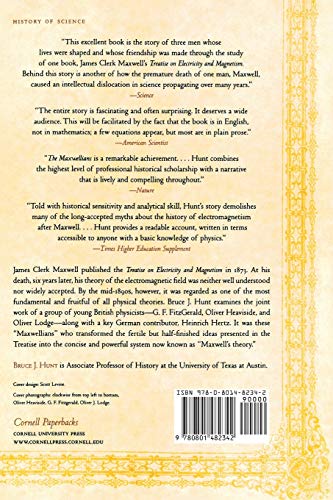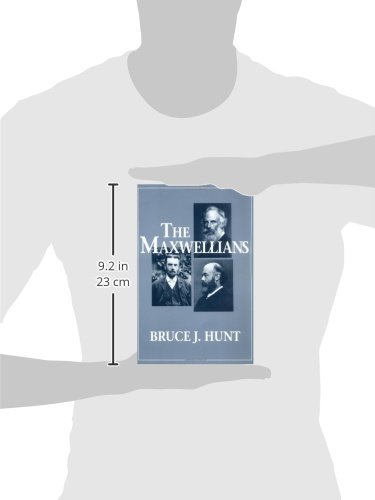Customer Services
Copyright © 2025 Desertcart Holdings Limited




📖 Discover the Past, Shape the Future!
The Maxwellians is a pivotal work in the Cornell History of Science series, offering a comprehensive exploration of the interplay between science and society. This book delves into the historical context of scientific advancements, providing readers with critical insights and fostering a deeper understanding of the evolution of scientific thought.
P**N
Wonderfully detailed description of the miracle men of mathematics and physics.
Wonderfully detailed description of the miracle men of mathematics and physics. Maxwell was only the beginning and few could make out what he had been describing. It was Oliver Heaviside and the others who were finally able to make a usable theory out of his many equations. Others at Cambridge would take Maxwell as the incorruptible word and never recover from it. Heaviside decided to let go of certain terms that were merely baggage to the theory and wrote out the equations in their simplest, and modern form. He called them Maxwell's equations even though it was his work that created them.The text hardly ever shows an equation of a vector but handles the details with great clarity. The descriptions do not drag or become tedious. The hunt is described both for the correct physics but also the many battles with those who don't think "all this math is necessary". Such battles made for much drama in Heaviside's life. A tremendously fascinating story of early electromagnetic theory. Well worth the read.
D**N
A Very Enjoyable Read
A work like this is a very challenging, often daunting task to orchestrate. Given this, consider the book as a whole, the high level of (enjoyable) writing, wonderfully constructed narrative, and valuable archival work (and ancillary research), I recommend this work to a very high degree. However, the recommendation doesn't come without qualification. In fact, my personal view is that history and philosophy of science are inseparable in most cases, the exceptions being histories of technological development or some other instance where the history admits little need to understand philosophical underpinnings driving everything. So the following will start with shortcomings, some things that might deter some readers, and then I will move on to what is specifically good about this book, the reasons I think it deserves five stars, despite the negatives.Quite honestly, I think Hunt failed to pay sufficient homage to the conceptual differences between Maxwell's thinking and the Maxwellians'. Not being a scholar on the subject, or even particularly well read, Hunt gives satisfactory grounds for second guessing his proposal that the only things connect Maxwell to the Maxwellians, and thus not dealing with James Clerk Maxwell in any real capacity, was a referee letter to Stokes about FitzGerald and the (Derridaean) thinking that there is nothing outside "The Treatise on Electricity and Magnetism." After reading the whole book, it is not clear what all has really changed between the two theories, and, therefore, it is difficult to assess whether Maxwell's theory has become the Maxwellians' theory. Certainly, there are additions in mathematics, and a few alterations; but there is plenty of support, just within the account Hunt gives, that there were tremendous differences that were metaphysical and ontological. I am fairly confident that further philosophical investigation would bear out that the action is precisely there: the differences in what J. C. Maxwell thought about the system of electrodynamics and what the Maxwellians thought. There are other points that Hunt doesn't develop, such as the Newtonian/Cartesian tension (Hunt mentions this in a single sentence), to name one. Finally, I am a little concerned about Hunt's mode of going about the history might extend to his treatment of the theory of electromagnetism. The concern is in regard to whether Hunt is projecting a modern understanding of physics onto the physics of the period. There are a couple of subtle points where I thought this could be the case, but it rose to my consciousness only afterword. I would say to be on the lookout for this (and let me know if you notice anything). It was a little difficult for me to conceive of the vector potential, A, was understood entirely as it is today. This is Hunt's area of expertise, so perhaps my intuition is wrong here, but it is something that jumped out at me.One thing that may turn off the reader who is not trained in physics is the amount of mathematics and physical concepts. On this point, it is one of the items that lends to its value as a piece of scholarship. However, it may detract for those who have no knowledge. To give you an idea, anyone who has been through Griffith's "Introduction to Electrodynamics" is fully competent for what is involved in the text. I should also say that not understanding the physics and math is not the end of the world. Students in my graduate survey of the history of science, untrained in physics, read it, glossing over the technical details, and gleaned much from it.Now, of the material he includes, I don't think one could do a better job. If I were going to be critical, I would say there were many places where he could have gone further in depth. As far as the narrative and research, before coming to this book, I was unaware of the fact that Maxwell had not developed "his" equations. Hearing about the Maxwellians is a marvelous book for putting the development of physics into perspective. A colleague, also a physicist, told me that she had an old professor that thought Newton was a hack who stole everybody's work; the reason, of course, that this professor thought such was a consequence of see where Newton got his ideas (that whole `standing on the shoulders of giants' must be taken seriously). Hunt does well to dismiss the history/mythology that scientists tend to create from the snippets of what they do know. The social dynamic present among the Maxwellians is well constructed, from correspondences that really bring the people to life. Hunt can certainly paint a picture with words. He also makes good use of diagrams for illustrating the ether models that the Maxwellians had in mind. If I were to say what the book is about, in a sentence, so as to grab your interest, it would be this: A progression, beginning where Maxwell left his theory, the Maxwellians work out, in theoretical and practical terms, the theory of electromagnetism, ironically finishing at a point in which some their core principles (e.g., notion of the ether) have been made vulnerable, setting the stage for relativity.I recommend this book to all, especially anyone working in engineering and physics. For the intellectual and dilettante, being patient with the mathematics and physics will likely be worthwhile, as I think this is a particularly good book for independent minds who want to understand the development of the modern sciences.
I**N
Top shelf study
I was led to this book by Oliver Heaviside. Eighteen months ago I had never heard of the man, but here we are. In my own work I was exploring, searching for a way to describe a function that is nowhere until some point (in time) whence it is everywhere; but I had no original idea how to do it. By happenstance I was reading a book on partial differential equations (author's name forgotten - as I write this review I am separate from my study and cannot just walk to my shelves to check) in which use was made of the "Heaviside step function." This was exactly what I needed for my own work and thus was a fan drawn to an amazing figure in the story of science. I Googled and Binged. Reading Graham Farmelo's book on Dirac the man reappeared as a major figure in electrical engineering whose books Dirac has read as a student in Bristol. Oliver Heaviside had quickly located himself among my pantheon of culture heroes.So I recently acquired a biography of him (as yet unread) and this work on The Maxwellians which I have finished reading about an hour ago. It is probably foolish to sit down and write a review so rapidly after completion, for in the heat of joy, the flurry of excitement, I am bound to forget key bits of importance and neat details. But what the hell. Excitement dominates; I have come to keyboard to share my pleasure, my respect and appreciation for Bruce Hunt's wonderful book.I like history of science but don't read a lot of it. I knew of Maxwell's equations from first year physics (as far as I went) many decades ago, and the homage paid to him by giants like Einstein (who ignored Heaviside's role in their development). But I had no idea, never having read anywhere, that Maxwell's equations as we know them were really Heaviside's equations - or as Heaviside himself modestly claimed, they are Maxwell's Heaviside's & Hertz's equations. I had heard of Fitzgerald in terms of his pre-relativistic contractions, but knew nought of the man himself. However I had never heard of Lodge. I had heard of the Poynting vector but had no idea what it is. Of course I knew of Hertz. And I read of Larmor in Farmelo's book where he appears as a minor villain who conservatively failed to help or mentor Dirac even though both were from St John's College, Cambridge. So putting it all together almost the entire Maxwellian experience was a new discovery for me.It's a cliché but this is a book I found hard to put down. When I was forced to distract from it by daily life I could not wait for my next time alone to return to it. The tale is not gripping in the sense of a plot filled thriller. But it is indeed gripping in the way it builds to discovery of the electrical theory developing in tortuous circuitous (pun intended - weak) pathways. Fascinating stuff.I am also intrigued that a historian could be so on top of such material. Hunt gets my great regard for his ability to research and write history but also for his ability to handle and not shy away from mathematics and physics so necessary to this tale.A brilliant book. One I will treasure on my shelves. It has provided the more general introduction I required to the whole set of members and problems of that time. Now I can happily embark on the more focussed biography of Heaviside which arrived in the same mail a few weeks ago.
M**W
Truly Excellent
A story of history science friendship and discovery by the best and brightest of their time. Excellently written. A true gem among my collection. Well done Dr. Hunt!
C**N
una obra maestra
Un hermoso ejemplo de como se debe escribir historia de la ciencia actualmente. La escuela Mawellina contribuyo a entender mejor el electromagnetismo y produjo avances tecnológicos de primera importancia como el telégrafo (un internet primitivo que provoco una de las revoluciones mas asombrosas de la comunicación). Las equaciones de Maxwell, tal como las conocemos fuero escritas por los los Maxwellianos.
喧**喧
新鮮な視野が開けました!
19世紀末の電磁気学はイギリスとイギリス以外とで異なる考え方(イギリスが電磁場の近接作用論でそれ以外は電気粒子の遠隔作用論)が支配的だったことはよく知られた科学史上の事実です。イギリスの近接作用論はファラデーが提示した場の考え方に19世紀半ばにトムソンとマクスウェルが乗っかったことから始まった英国純正の新興のアイデアなのに対して、遠隔作用論は19世紀初頭のフランスのラプラスにまで遡りドイツでヴェーバーらに受け継がれ発展した大陸全体で権威を持った由緒正しい考え方。マクスウェル理論のわかりにくさもあって19世紀末まで分裂状態は続きました。こうした分裂は、帝国主義ナショナリズムの時代と物理学の国際コミュニティが未成熟だった時代の反映だったのでしょうが、よく調べていくと、どうやら19世紀イギリスの世界支配を支えるイギリスの科学技術者たちが直面した技術的課題と近接作用論が密接に関係していたらしい。イギリスの世界支配は電信網を支える海底ケーブル技術と不可分だったが、この海底ケーブル技術が直面していた技術的課題(遅延効果)の理解には近接作用論が不可欠だったのです。それに対して他の国は海底ケーブル技術などには縁がなかったため遠隔作用論のままで特に不都合を感じずにいたわけです!そもそも場の理論は機械論的なモデル理解を重視するスタイルと不可分だったこともよく知られた事実ですが、著者によると、このスタイルは世界に先駆けたイギリスの産業革命がもたらしたものであると同時に、教育上の理解しやすさの重視とも関係しているらしい。一般の人にも理解できるアナロジカルな説明を重視する態度がイギリス物理学のスタイルの背景にあるのだというのです。思うに、それはまさにファラデーやヘヴィサイドのような下層階級出身の市民科学者を生み出したイギリス市民社会の他国に先んじた成長の表れだったのだという理解が可能だということではないだろうか。
Trustpilot
3 weeks ago
1 month ago